Shares of South Korean appliance makers rose as investors shrugged off a recommendation by U.S. trade officials that President Donald Trump impose tariffs on foreign-made washing machines they say are undercutting domestic manufacturers.
At a hearing in Washington, D.C., earlier this week, commissioners from the U.S. International Trade Commission, offered a range of choices within a three-year quota system for Trump, who is expected to issue a final ruling by early next year. South Korea’s trade ministry said it may consider filing a complaint with the World Trade Organization after a decision is reached.
The case is a test of Trump’s vow to crack down on countries that don’t follow international trade rules. American appliances giant Whirlpool Corp. has accused Samsung Electronics Co. and LG Electronics Inc. of selling washing machines in the U.S. at below fair-market value while shifting production around to avoid U.S. anti-dumping duties.
LG said in a statement Tuesday that it’s reviewing the ITC’s move, calling Whirlpool’s complaint an effort to restrain competition. Samsung also issued a statement Tuesday saying “any tariff would raise prices, provide fewer product choices and impair job creation at our South Carolina factory.”
Samsung shares rose 1.2% in Seoul on Wednesday, while LG Electronics jumped 3.2%.
‘Negligible’ Impact
While Samsung’s washing machine business could be hit by tariffs, the overall impact on the conglomerate would be negligible, according to Morningstar analyst Dan Baker in Hong Kong. “It makes a tiny proportion of its profits from washing machines,” he said. “It makes the vast majority of its money from memory semiconductors, smartphones and display panels.”
Whirlpool said in a statement that it’s encouraged by the ITC’s recommendations and is confident the Trump administration will take action “to prevent continued abuse of existing trade laws by companies that seek an unfair advantage over American workers.” Its shares gained 2.2% Tuesday in New York, for the biggest one-day advance since Oct. 20.
The ITC officials suggested the U.S. impose a 50% tariff on imports of large residential washing machines above 1.2 million units. The rate would be lowered in subsequent years to 45% and then 40%. Two of the four commissioners also recommended an additional tariff of as much as 20% on imports below the 1.2 million-unit threshold.
Manufacturing Hubs
The commissioners recommended excluding nations that have trade agreements with the U.S. from the tariffs, but South Korea’s Samsung and LG brand washers would be affected because they largely are imported to the U.S. from manufacturing hubs in Vietnam and Thailand. The U.S. is currently in talks to renegotiate its trade pact with South Korea.
Excluded from the import tariff recommendations are countries with which the U.S. has free-trade deals, including Australia, Canada, Mexico and Singapore, according to the ITC’s statement.
South Korea will coordinate with relevant countries such as Vietnam before deciding whether to file a complaint with the WTO, the trade ministry said in a statement Wednesday released after a meeting with LG and Samsung officials.
The ITC’s recommendations ratchet up trade tensions with a key ally at a sensitive time between the nations on economic and geopolitical fronts. In addition to the U.S. pursuit of a free-trade agreement with South Korea, American diplomats are trying to work with their counterparts in Seoul to address North Korea’s nuclear program.
In a so-called safeguard petition filed with U.S. trade authorities in May, Whirlpool alleged that Samsung and LG pursued a strategy of selling washing machines in the U.S. at artificially low prices. The South Korean companies would move production work between Asian countries to do an “end run” around U.S. anti-dumping laws, Whirlpool said.
Creating Jobs
The ITC, a federal agency that investigates trade disputes, ruled last month that growing imports of residential washing machines was causing “serious injury” to American manufacturers. Whirlpool says correcting the problem will help create U.S. manufacturing jobs.
The case is the latest in an ongoing dispute extending back years between the appliances makers. Whirlpool alleged in 2011 that its overseas competitors received unfair government subsidies. In 2013, South Korea filed a World Trade Organization dispute challenging the U.S. Commerce Department’s calculations. It won a ruling from the WTO last year.
The ITC’s washing-machine recommendation comes as it weighs a separate high-profile trade dispute between Boeing Co. and its overseas rivals. The commission is expected to make a decision next year on the plane maker’s claim that it was injured by Bombardier Inc.’s strategy of selling the C Series passenger jet at “absurdly low prices” in the U.S. The Commerce Department issued a preliminary ruling in September imposing duties on the Canadian aircraft.
By Sarah McGregor and Richard Clough, with assistance from Jing Cao and Corinne Gretler
About the Author
Bloomberg
Licensed content from Bloomberg, copyright 2016.
